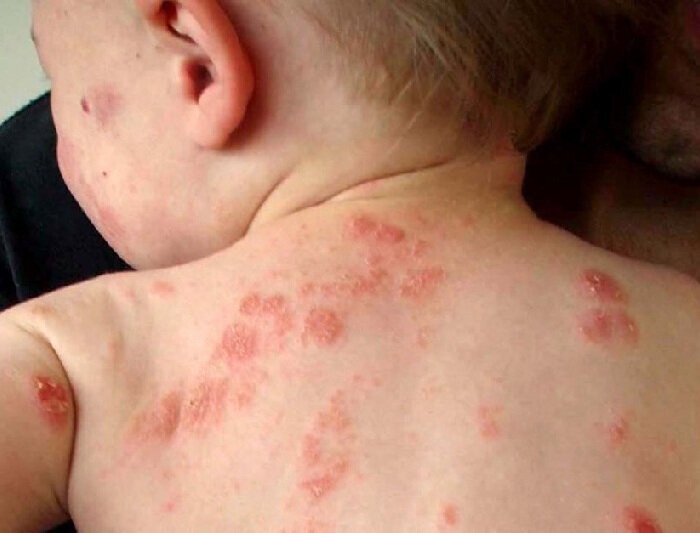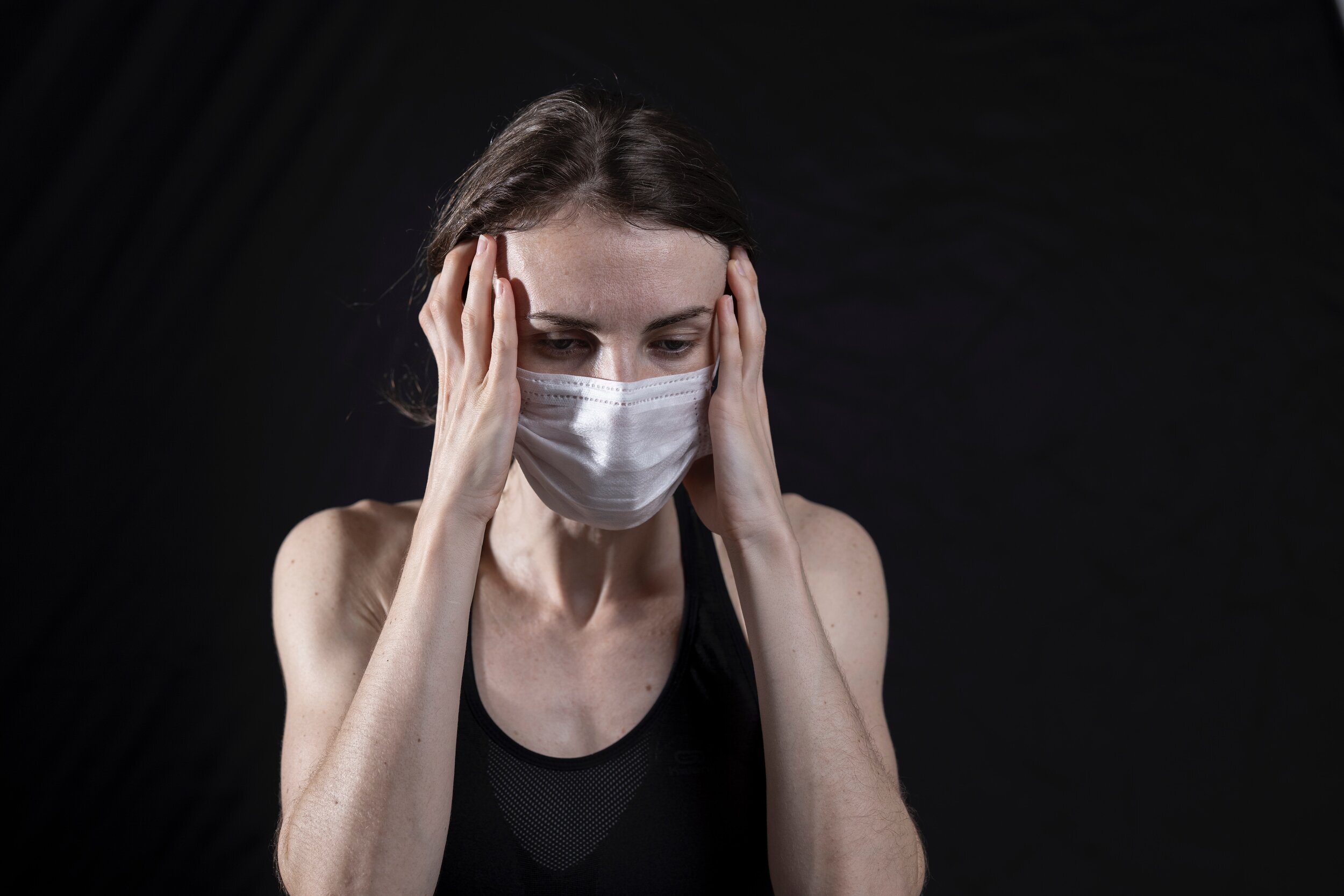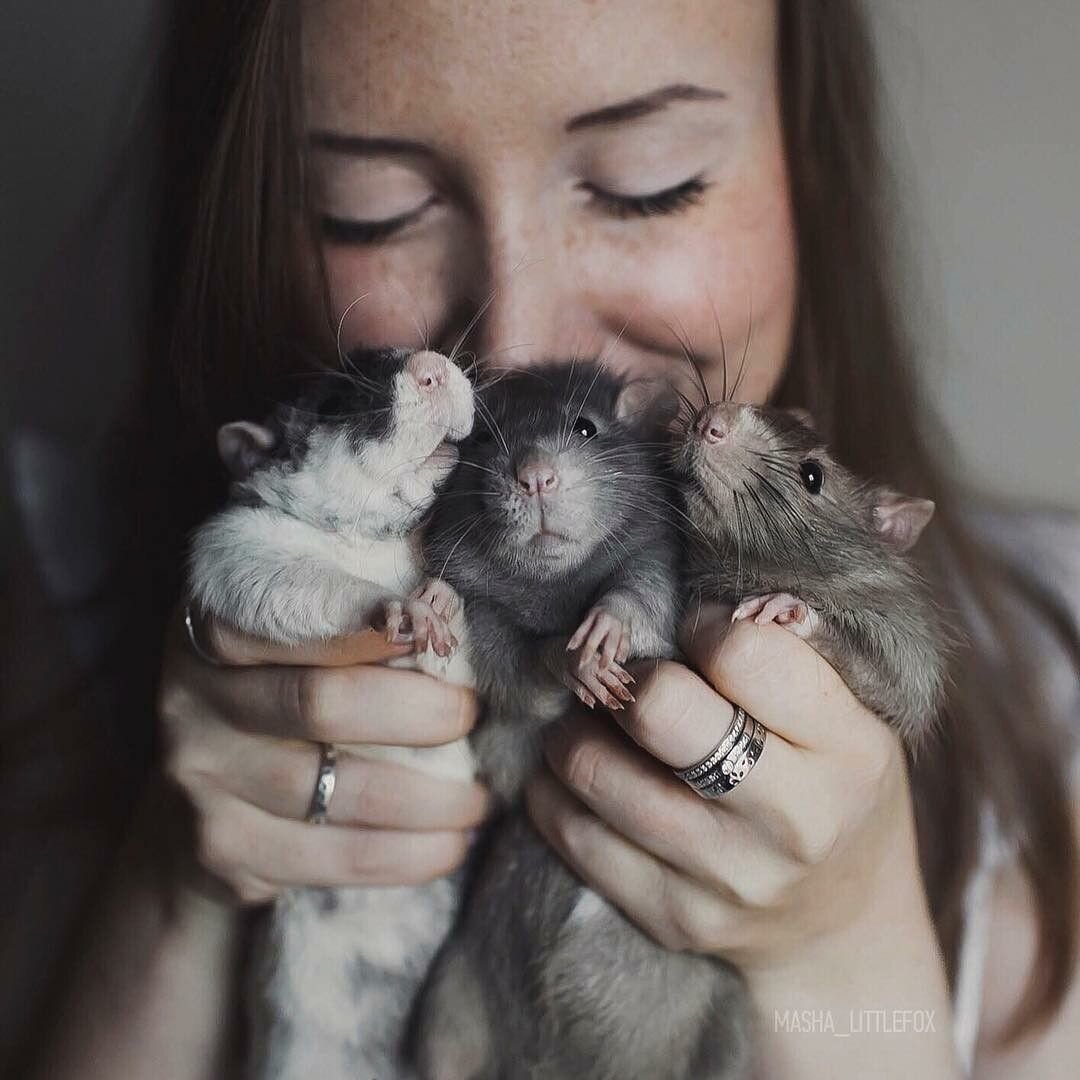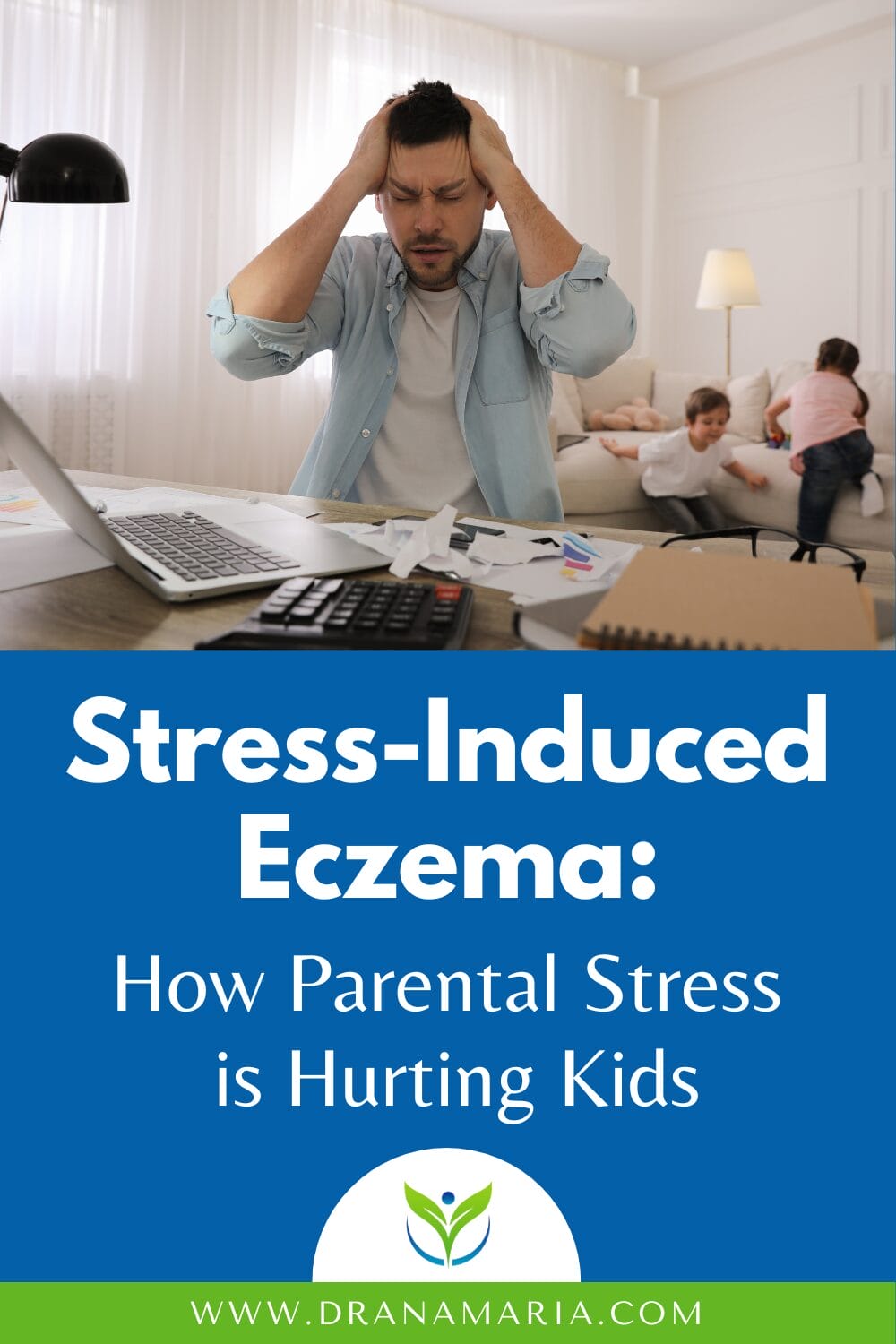
Stress-induced eczema is probably the most under-appreciated cause of eczema in the world. More and more studies are showing the relationship between stress in individuals or families, and the health effects stress wreaks (i.e. the relationship between stress and eczema).
What Studies Show
In Quebec Canada back in 1998 a severe cold snap hit the area. A succession of ice storms hit the area causing power outages to nearly 600,000 people during some of the coldest weeks of the year. The power was out for many weeks in some hard-hit areas with hundreds of thousands of families being temporarily displaced and many kept in emergency shelters. This unfortunate situation gave scientists an interesting research opportunity.
Given the sheer number of people affected, a large number of women happened to be pregnant at the time. This allowed scientists to study these women compared to women in the same area who conceived and carried children without a stressful evacuation and see the differences. A number of studies have been born out of this unique situation. One of the key elements seen in babies carried during this time was a change in their fundamental DNA. Many of these changes reflected generalized inflammation seen with maternal stress.
As these children were followed as they grew, it was noted but they had an increased risk of a number of diseases; particularly inflammatory type diseases such as asthma, eczema, and even some cognitive and other learning effects. It actually helped to credit and reinforce the diagnosis of prenatal maternal stress syndrome(PMNS). It appears that stress begins to play a role in eczema development from the moment of conception.

Stress in Parents
I have seen so many expecting mamas in my clinic who are stressed out of their minds worrying about every aspect of their pregnancy, childbirth, body image, work, social media, finances and host of other daily things. The problem is our brains don’t differentiate between a sabre tooth tiger ready to eat us for lunch and the work project that’s overdue. Both things trigger an area of our brain termed the hypothalamus which stimulates the production of cortisol, also known as the stress hormone.
Cortisol gets us ready for a fight or flight – shifting resources away from non-vital functions to urgently needed actions for survival. So things like higher heart rate, breathing capacity, muscle energy, and vision, are prioritized over food digestion and the immune system. Not much use fighting a virus or bacteria that may take weeks to kill us when a violent death is staring us in the face.
FOR MY COMPREHENSIVE HOLISTIC ECZEMA TREATMENT SYSTEM CLICK HERE
This chronic dysregulation of the immune system (stress), modulated by cortisol, puts us at risk for eczema in several ways.
Cortisol is an immune system regulator and ultimately causes an imbalance in the body’s different types of immune responses, resulting in the increase of cell signaling molecules that promote inflammation. Part of this cascading response from the immune system imbalance is an increase in the production of immunoglobulin E (IgE) antibodies, which cause allergic reactions.
The body also experiences various other physiological changes that affect the skin.
For example, the production of mast cells increases — these white blood cells release histamine, a compound that causes itchiness. (Understanding Histamines and Eczema) Stress also causes our blood vessels to dilate, which leads to a further release of histamine. Additionally, sensory nerves release molecules that can disrupt the normal functions of the outermost layer of the skin (the skin barrier).
These and other responses work in concert during stressful events and drive up eczema symptoms.
In pregnancy, cortisol easily crosses the placenta bombarding the fetus with stress hormones, preparing the baby for attack. Unfortunately, persistent exposure to these high levels of cortisol then alters the baby’s immune system. So what if the pregnancy and delivery was rainbows and unicorns but the maternal stress begins after birth?
Unfortunately, the same thing occurs.
Studies have found that when parents are significantly stressed during their child’s first few years of life, some of the children’s genes – involved in insulin production and in brain development – were affected even years later, in adolescents. The brain changes that stress causes are not only hormonal, they can also be genetic – or “epigenetic,” which is a growing area of research. Epigenetics is the study of how genes can be turned on or off with certain environmental cues, stress being one of them.
So not only does parental stress contribute to childhood development of eczema, but also increases the risk of lifelong stress in the child. The genes in question are altered through a process called methylation. In a famous study on rats, researcher Michael Meaney at McGill University found that rats that spent significant amounts of time grooming and licking their pups, had pups that were much calmer and more exploratory than their counterparts who got little to no grooming. This was accompanied by changes in their DNA. Interestingly, when the neglected pups were placed with foster mothers who groomed and licked them, their DNA transformed to look like the well cared for animals.

In the rat world, grooming and licking is the hallmark of a low stress environment. Our children’s brains (and DNA) are actually changing physically as a response to their stressed out parents. These brains then produce stressed out kids who go on to perpetuate the cycle with their own children.
Another persuasive argument for the effect of parental stress on kids is what’s called heart brain synchronization. An electromagnetic field is created by the heart as it beats. This is what we measure when we place leads and perform an EKG if someone is having a heart problem. The interesting thing is that our brain’s electromagnetic field (EMF) changes as the heart’s EMF changes. And even more astonishing is that the brains of people we are touching or are close to will also change based on changes in our heart beats.
Studies have confirmed that if I am stressed, the brains of those around me will synchronize to my stress level. Thus, our children are incredibly sensitive to changes in our general stress level. And this is even more pronounced in utero. I have discussed other primary Causes of Eczema in previous posts as it relates to the gut. Thus, if you are under stress AND have a poor diet, you have created the perfect eczema storm.
Side-effects of Stress
So by now I have hopefully convinced you, that we as parents are largely responsible for instigating the stress response in our children. Worse still is that ongoing stress in your child can cause or exacerbate a number of issues including:
- Skin and hair problems, such as acne, psoriasis, and eczema, and permanent hair loss
- Mental health problems, such as depression, anxiety, and personality disorders
- Cardiovascular disease, including heart disease, high blood pressure, abnormal heart rhythms, heart attacks, and stroke
- Obesity and other eating disorders
- Menstrual problems
- Sexual dysfunction, such as impotence and premature ejaculation in men and loss of sexual desire in both men and women
- Gastrointestinal problems, such as GERD, gastritis, ulcerative colitis, and irritable colon
Our culture is so inundated with stress, that many of us don’t even realize it has become our new baseline. Ask yourself these questions:
- Do I take sleep medications?
- Do I take anxiety medications?
- Am I snappy?
- Am I on the edge?
- Do I blow up easily?
- Do I need a drink around 3-5 pm to deal with life?
- Do I have a drink in the evenings so the kids are less annoying or to calm myself?
- Do I have a need to constantly move and be productive?
- Do I eat a spectacular diet but still feel fluffy around the middle?
Ways to reduce stress
So what is the antidote to all this stress? Let’s start with the low-hanging fruit – our phones. American adults spend an average of 10.5 hours on screen per day and 3.5 hrs of that is on our mobile devices. The devices give off electromagnetic radiation that activates your brain – even when the phone is not in use. Harvard researchers placed participants in a brain scanner along with cell phones that were either switched off or on. Only when the phones were switched on, participants showed increased glucose (sugar) uptake in the brain. Thus our phones are occupying our brains even when we are not using them! And to make matters worse, our phones are now attached to our wrist.
FOR MY COMPREHENSIVE HOLISTIC ECZEMA TREATMENT SYSTEM CLICK HERE
Have questions?
We will answer! Book a call here to chat with one of our program experts and get all your questions answered.
The most obvious take home for me from this study is that we must get phones out of the bedroom. First of all, if the phone is on the nightstand, we are more likely to use it at night, increasing our exposure to blue light and negatively impacting our sleep (another cause of stress). Secondly, even if we are not using them, the phones are still activating our brains. Take note – airplane mode is NOT good enough as the bluetooth and wifi still signal the brain. If it can’t be out of the room it should be powered completely off.
Next, notifications should be turned off on your phone. Each time we get a notification, it takes us approximately 10 minutes to return to the task at hand. This is particularly true for social media notifications, as these often take down the rabbit hole of an instagram feeding frenzy, my personal weakness.
Lastly, many of us are now attached to our phones to get the latest and greatest doom and gloom about COVID. This kind of news has raised the ante on stress. Not to mention the vaccine and masks debates. Pure poison.
I used to wear my “busyness’ as a badge of honor. When asked “how am I doing?” by a friend, I responded proudly with “really busy”. In fact, I don’t think I ever heard a mom respond “You know, I’m so stressed and exhausted that I just sat on the couch all day and watched Netflix.” A friend of mine has 3 children who are all severely over scheduled. Recently, she was complaining that she couldn’t figure out a way to fit piano practice between her son’s football and soccer practices. One of her solutions was to feed the other kids dinner in the car while driving between practices to “free up some time”. I told her she was nuts and that the rational thing to do is drop a few activities – but as I thought about it, I realized this was me for many years.
We think we are creating well rounded kids with all these activities, but we are just molding stressed out children who will end up resenting us for forcing them to participate in every sport, dance, instrument, club, or committee under the sun.
And while I am at it, we mothers need to get better at outsourcing. Kids should be doing dishes and other chores even if they do a crappy job – get over it (I mean this in the nicest way possible). Hire nieces/nephews, neighborhood kids to help out with babysitting, homework, grocery shopping, etc. There is no medal of honor awarded to the busiest mom each year. Remember, it was the rats who took their time grooming and licking their pups that fared best, not the ones who had each pup in 5 types of rat gymnastics.
Try to master the art of single tasking. Studies have shown that multitasking is actually a pipedream and the human brain functions poorly while performing multiple tasks. So put your phone away while playing with your child, turn off your electronic device when your spouse or child walks into the room after work or school, help with homework after you cooked dinner rather than during meal prep, eat dinner seated as a family, and watch your children thrive.
Social media can be particularly stress inducing for our adolescent children. Any embarrassing social miscue that was once only seen by a few, now is potentially seen by thousands with catastrophic reputation and self worth implications. Limiting time on social media, particularly before bed can help. Talking to our teens continuously about the unrealistic standards on social media and educating them that self worth is not derived from “likes” online, but from real relationships. Lastly, be the role model for your child on social media.
My take home point: do a Stress Evaluation. Could you and your child be at risk from the toxic effects of stress? If yes, you are not a bad parent and you are not doomed. You are like the rest of us, trying to do the best you can. But maybe doing the best we can is by saying No. Your child’s skin will thank you.
Yours in Good Health,
Dr Ana-Maria Temple
Did you find this post helpful? Save for later!





